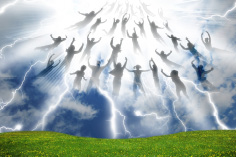 The "Rapture Doctrine" advocated by some Christians deals with what happens to the Church at Jesus' return - the "Second Coming," as it is usually called. The doctrine says that believers experience a kind of ascension; that they will be drawn to meet Christ sometime at His return in glory. The believers in the rapture essentially use a single passage as evidence: «For this is what we say to you with a word of the Lord, that we who are alive and remain until the coming of the Lord will not precede those who have fallen asleep. For he himself, the Lord, will come down from heaven when the call is made, when the voice of the archangel and the trumpet of God are heard, and the dead in Christ will rise first. After that we who are alive and who are left will be caught up at the same time with them on the clouds, to meet the Lord in the air. And so we will be with the Lord at all times. So comfort one another with these words »(1. Thessalonians 4,15-17).
The "Rapture Doctrine" advocated by some Christians deals with what happens to the Church at Jesus' return - the "Second Coming," as it is usually called. The doctrine says that believers experience a kind of ascension; that they will be drawn to meet Christ sometime at His return in glory. The believers in the rapture essentially use a single passage as evidence: «For this is what we say to you with a word of the Lord, that we who are alive and remain until the coming of the Lord will not precede those who have fallen asleep. For he himself, the Lord, will come down from heaven when the call is made, when the voice of the archangel and the trumpet of God are heard, and the dead in Christ will rise first. After that we who are alive and who are left will be caught up at the same time with them on the clouds, to meet the Lord in the air. And so we will be with the Lord at all times. So comfort one another with these words »(1. Thessalonians 4,15-17).
The rapture teaching seems to go back to a man named John Nelson Darby around 1830. He divided the time of the second coming into two parts. First of all, before the tribulation, Christ would come to his saints, they would be raptured with him. After the tribulation he would come back to earth with them and only then did Darby see the real Second Coming, the second coming of Christ in splendor and glory.
Believers in the rapture have different views on when the rapture will occur with a view to the "great tribulation": before, during, or after the tribulation. In addition, there is a minority opinion, namely that only a select elite within the Christian church will be raptured at the beginning of the tribulation.
If we 1. Looking at the Thessalonians, the apostle Paul only seems to say that when the "trumpet of God" sounds, the dead who have died in Christ will rise first and ascend together with the believers who are still alive "on the clouds in the air to meet the Lord ». There is no question of the whole Church - or part of the Church - being raptured or transferred to another location before, during or after the Tribulation.
Matthew seems to be speaking of a similar event: “But immediately after the distress of those days the sun will darken and the moon will lose its shine, and the stars will fall from the sky and the powers of the heavens will be shaken. And then the sign of the Son of Man will appear in heaven. And then all the tribes of the earth will mourn and will see the Son of Man coming on the clouds of heaven with great power and glory. And he will send his angels with bright trumpets, and they will gather his elect from the four winds, from one end of heaven to the other »(Matthew 24,29-31).
In Matthew Jesus says that the saints are gathered "but immediately after the tribulation of that time". The resurrection, gathering, or, if you will, the rapture takes place summarily at Jesus' second coming. From these scriptures it is difficult to understand the distinctions that rapture doctrines make.
For this reason, the church takes a factual interpretation of the scriptures mentioned above and does not see a special rapture as given. The verses in question simply state that the dead saints will rise and unite with those still alive when Jesus returns in glory.
The question of what will happen to the church before, during and after Jesus' return remains largely open in Scripture. On the other hand, we are certain of what the scriptures clearly and dogmatically say: Jesus will return in glory to judge the world. He who has remained faithful to him will be resurrected and live with him forever in joy and glory.
by Paul Kroll
This website contains a diverse selection of Christian literature in German. Translation of the website by Google Translate.